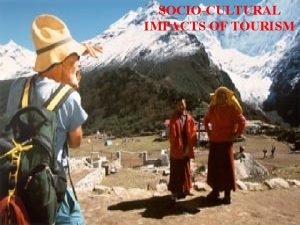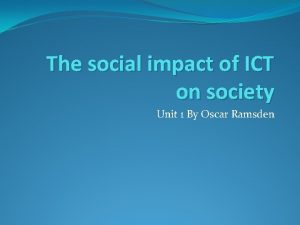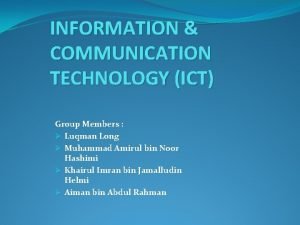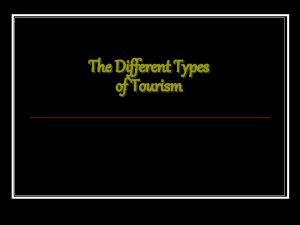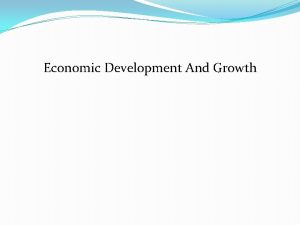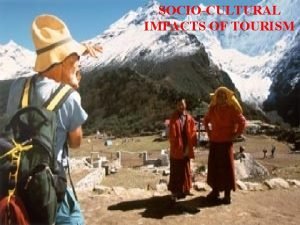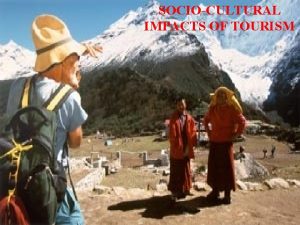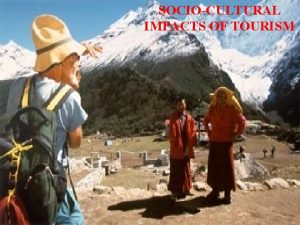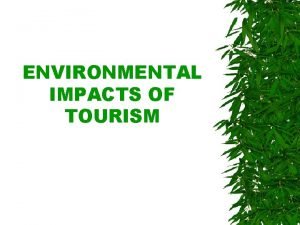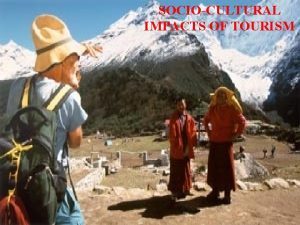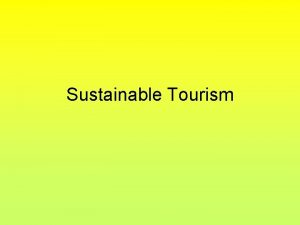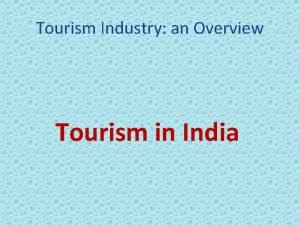The Economic Impacts of Tourism Positive Impacts on














- Slides: 14

The Economic Impacts of Tourism Positive Impacts on the Economy 1) Creating Jobs Tourism is a highly labor intensive industry. It depends very much on a large number of people with various levels of skills and abilities (e. g. waiters, tour guides, hotel managers, etc. ). In general, tourism industry has a greater capacity to provide more job opportunities than any other industries. There are 2 main types of employment generated by tourism: direct and indirect.

�(i) Direct Employment - Which is employment generated from business that directly provides services to tourists Examples: • accommodation and catering (hotels) • tourist attractions and business facilities (e. g. exhibition and convention centers) • tourism promotion and information (e. g. travel agencies or tourist boards)

�(ii) Indirect Employment - Refers to jobs of those people who either serve both local people and tourists, or manufacture goods and provide services which are bought or used by business and organizations which serve tourists directly. Examples: • taxi drivers • shopkeepers • factory workers manufacturing bedroom furniture for sale to hotels.

�Sectors which employ the most employees in the tourism industry are: • food services • accommodation • transportation • entertainment • travel agencies and tour operators

2) Providing Tax Revenue Tourists may pay tax like most other people. As they come from other regions or countries, their expenses result in an increased tax base for the host country. Government receives these taxes from: (i) Direct Taxes • Salary tax (on personal income) • Profit tax (on business) • An increase in tourist expenses would result in an increase in income of people working in the tourism industry.

Profit of business owners which therefore increases the tax revenue of the government (ii) Indirect Taxes • Turnover tax • Expenditure tax • Departure tax and hotel room tax - Turnover tax is paid on consumption. Two major types are sales tax and value added tax. Sales tax is levied by the government on goods and services that are passed directly to consumers. Value added tax (VAT) is an indirect tax on goods and services. Tourists pay the tax without knowing the exact amount since it is included in the price of the goods and charge for the services.

Negative Impacts on the Economy Tourism profits motivate many countries in encouraging tourism development, however, there are costs to tourism. 1) High Consumer and Land Prices A flourishing tourism industry will place great pressure on the limited resources such as food, land, transport, electricity and water supply, etc. of the host economy. An increasing demand on these resources and facilities may result in inflation, thus causing negative effects on local residents. Higher consumer and land prices may result

2) Over-dependency on Tourism depends very much on external demand factors. A large proportion of expenditure of international tourism is generated from a small number of developed countries. A change in the economic condition of these countries will greatly affect the number of tourists going to tourist destinations. Also, tourists’ taste is somewhat “fickle”; the once popular destination may become out of fashion quickly. High dependence on tourism should be avoided. High dependence occurs when a region becomes too dependent on tourism. Subsequent decline in the tourist flow to that region may greatly affect the economy of the area.

3) Leakage Additional income generated from tourism may not be as much as it should be if there is leakage. Leakage is anything that causes the profits from tourism to drain out of the economic system. Leakage can be: • expenditure on imported goods and services required by tourists • expenditure on imported goods and services required by tourist business • money earned and sent home in overseas countries by foreign workers in tourism industry • profits of foreign-company-owned tourist facilities diverted overseas

How Leakages Happen? (i) Import Leakage When the host country cannot supply the products required, it is common that destination countries will import goods and products from abroad to satisfy tourists’ demands, e. g. equipment, foods and drinks. On the other hand, it is due to the inferior quality of the products provided by the host country that cannot meet the standards of the international hotel chain.

(ii) Export Leakage In other word, the host society ‘exports’ their products, which are the tourist facilities and services in the destination where visitors enjoy. But since most of these facilities and services suppliers are financed and controlled by foreign investors, the profits earned will be taken back to the investors’ home country.

The Environmental Impacts of Tourism Positive Impacts on the Environment 1) Preservation and Conservation of Environment One of the arguments in favor of tourism is that uncontrolled urbanization, modernization and industrialization cause great damages to the natural environment. Tourism can be seen as an alternative economic development which provides the necessary motive and money for preserving the archaeological treasures and ancient monuments, and conserving the natural resources for the continued enjoyment of both tourists and local residents.

Wildlife and forest reserves have been set up and scenic lands have been preserved partly due to their ability to attract tourists. For example, some east African countries such as Kenya and Tanzania have established large natural parks and game reserves for wildlife as they know that wildlife is the most important tourist attraction in East Africa. Without the economic return provided by tourism, these areas might well be converted to agriculture, mining or other forms of industrial development which cause great harm to the natural habitats.

2) Enhancement of Environment It is often the environment itself that attracts tourists to a destination. An example is the beautiful mountain scenery of Switzerland. Any tourist destination hoping to attract tourists will try to improve its image by planting flowers, developing well-designed tourist facilities such as attractive landscaped hotels. Tourism also provides incentive for “cleaning up” the overall environment. This can be done through control of air, water, and noise pollution, littering and other environmental problems.
 Positive impacts of tourism in glasgow
Positive impacts of tourism in glasgow Positive impact of economic in tourism
Positive impact of economic in tourism Negative social impacts of tourism
Negative social impacts of tourism Negative social impacts of tourism
Negative social impacts of tourism Benefits of logging in solomon islands
Benefits of logging in solomon islands Materials technology positive impacts
Materials technology positive impacts Positive impacts of ict
Positive impacts of ict Science and technology
Science and technology Minoxfen
Minoxfen Materials technology negative impacts
Materials technology negative impacts Meaning of ict
Meaning of ict Mass tourism vs alternative tourism
Mass tourism vs alternative tourism Conclusion of growth and development
Conclusion of growth and development Lesson 2 our economic choices
Lesson 2 our economic choices Economic growth vs economic development
Economic growth vs economic development


